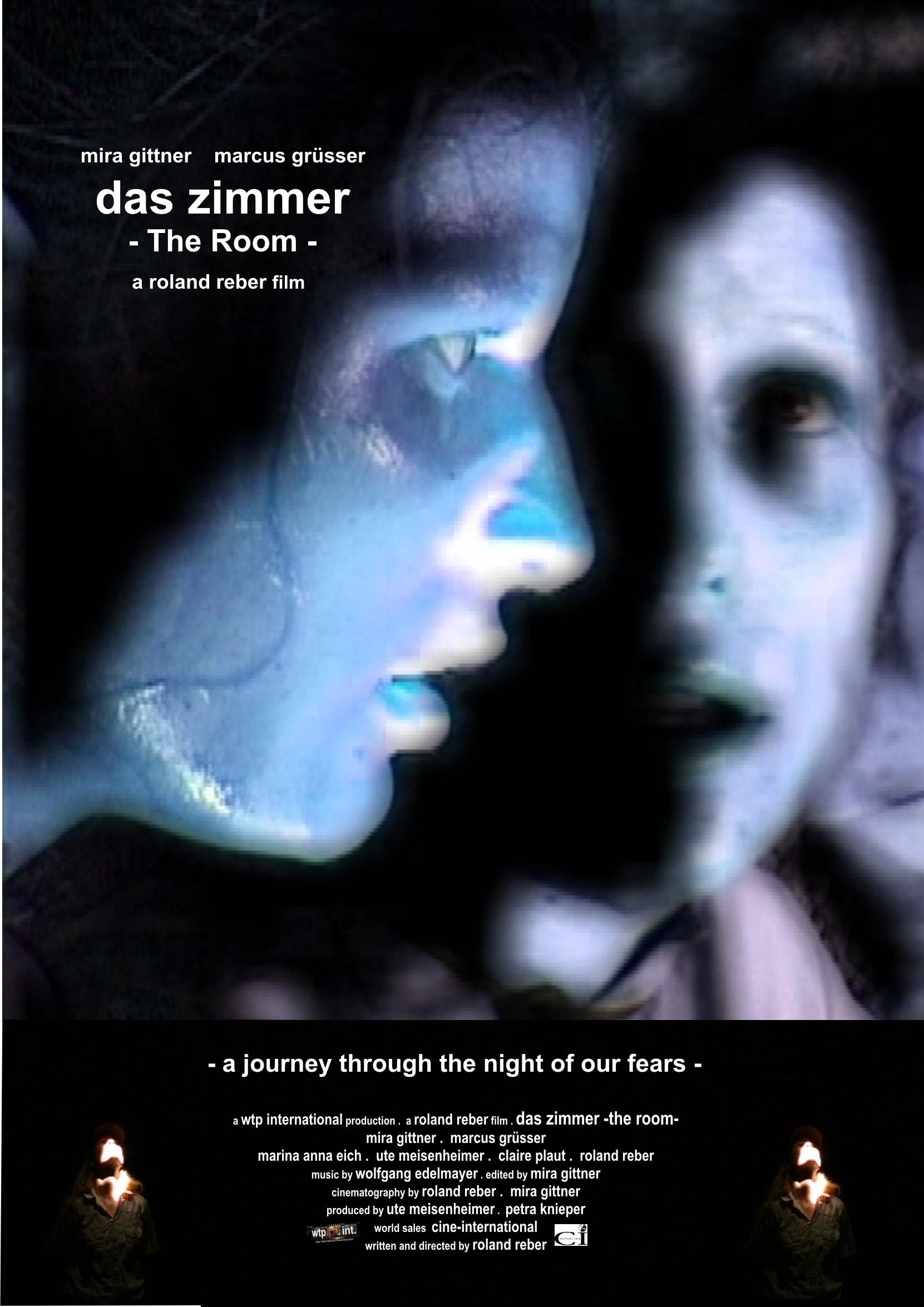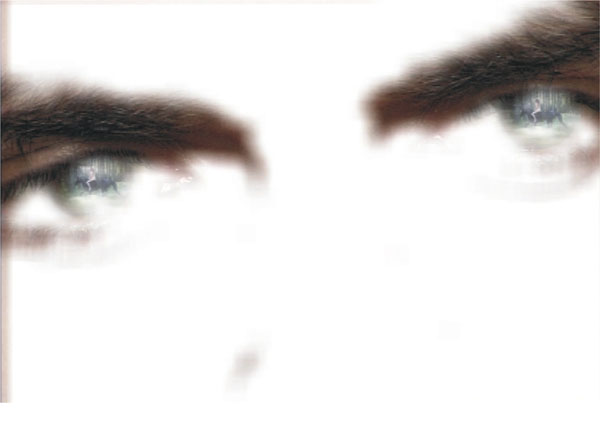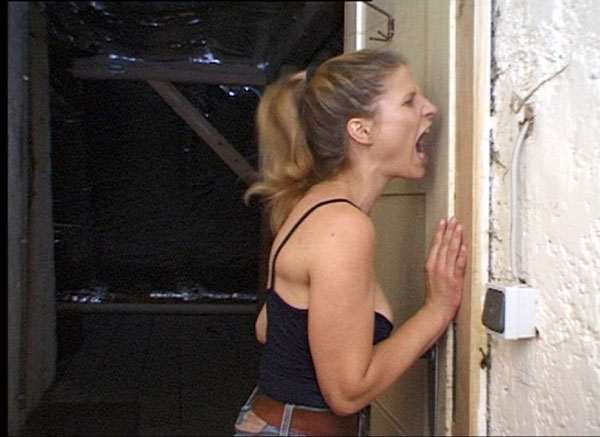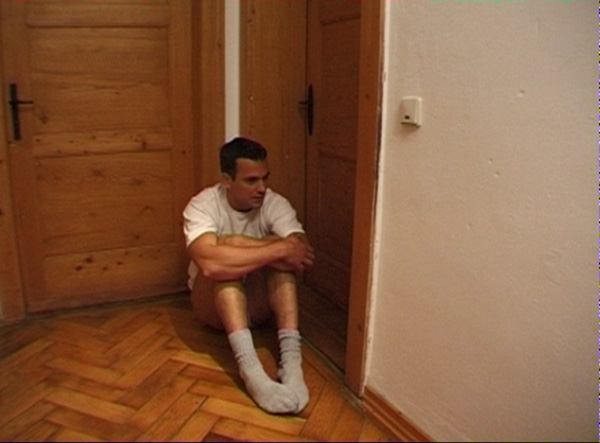
Mit dem Laden des Videos akzeptieren Sie die Datenschutzerklärung von YouTube.
Mehr erfahren

THE ROOM
a film by Roland Reber
Germany 2001, psycho-thriller, 91 min, rated 16
- “Intelligent cinema with an outstanding performance of main actors Mira Gittner and Marcus Grüsser.” (sneakfilm.de)
- “Visually interesting. Good actors. What more could we ask for?” (L’Orient Le Jour)
- “…What is remarkable about this motion picture is that Reber manages to have the traditional suspense and tension of a Hitchcock masterpiece, while at the same time exploring new and often uncharted territory by probing the human psyche on multiple, and often frightening, levels.” (Gordon Weaver, film publicist, USA)
since 27th of april 2007 available on DVD (in German)
with Mira Gittner, Marcus Grüsser, Marina Anna Eich, Claire Plaut, Ute Meisenheimer, Petra Knieper
camera: Mira Gittner, Roland Reber
editing: Mira Gittner
music: Wolfgang Edelmayer
production manager: Ute Meisenheimer
producer: Ute Meisenheimer
script & director: Roland Reber
production, sales & distribution: wtp international GmbH
A film about the secret chambers, we keep hermetically and preciously closed in our subconscious. A Journey to the hidden rooms of our soul.
“Whom are you running away from, Sophie? From me? from desire? Or from yourself? Run Sophie. The escape has no end. Because you are the escape yourself. Only you. You.”
Sophie (Mira Gittner), a student of Egyptology, and Christoph (Marcus Gruesser), an unemployed actor, apply to a classified ad in the newspaper for a job: „Someone to look after my house for six weeks – good payment“. It’s a box number ad and both get the job – with one not knowing of the other. They enter the house and meet the first time. The rules say that they can do what ever they want in the house except one thing: there is one locked room which they are not allowed to enter. They barely agree to this arrangement when strange things begin to occur. The inhabitants of the house are sure they are being observed, manipulated. Between dream and reality, they develop a labyrinth of emotions…
“I think all houses have a forbidden room, whether it is locked or not.” says Christoph and Sophie answers “just like our soul”
This short dialogue outlines the film. The heart of the story is not the mysterious incidents in the house but the hidden feelings of the occupants. More and more they project their hidden thoughts and feelings into this locked room.
THE ROOM is the first part of the Trilogy by Roland Reber.
The Films, which all tell an independent story, are united to a trilogy because of their common theme, the quest of the human for himself.
The first part, THE ROOM, realised as a psycho-thriller, won several awards all around the world and is broadcasted on TV in over 50 countries (e.g. Mexico, Argentina, Slovenia etc..) and was published on DVD in Spain in September 2006. The second part Pentamagica, a black comedy, was awarded for the best editing in Thessaloniki in 2003. The third part, The Dark Side of our Inner Space, a drama about the fun- and games generation had its world premiere at the Calcutta International Filmfestival in November 2003 in the “Roland Reber Films” section.
Since 27th of april 2007 all three films are available on DVD in Germany (in a 3/1 Roland Reber Box or separately – in German language).
FROM THE IDEA TO THE FILM
“THE ROOM dues its realisation to a packing case. Many years ago, approximately in 1985, I wrote a short manuscript because of a bet, with the basic story of the locked room. A friend editor told me it was impossible to write a story including suspense and eroticism in a very short time. This incited me and I wrote the manuscript in one night. I won that bet. Many years later this manuscript reappeared while archiving my texts and the film was made.” (Roland Reber)
SPECIAL WORKING METHOD
teamwork – literally
Through discussion and treatment with the subject, everyone approached the core of the later realised form. Everything, also camera and lighting and later editing and music, arose from the creative energy of the team. Each participant could bring in his own creativity and ideas. There was no rigid adherence to a primary concept, but a permanent re-definition and flexibility of the approach. The constant questioning of already developed ideas was as important as spontaneous innovations.
This working method is typical for Roland Reber, he realized many theatre plays this way. With THE ROOM he applied it to film for the first time.
CAST
SOPHI GERNER Mira Gittner
CHRISTOPH ZILLER Marcus Grüsser
STUDENT Marina Anna Eich
POST WOMAN Ute Meisenheimer
MONIQUE Claire Plaut
REAL ESTATE AGENT Petra Knieper
POST MAN Hubert Paul
MOTHER Bettine Block
SUSANNE Carolina Rath
HE Roland Reber
and the children: Margret Haub, Murmel Störzbach, Philipp Trauer, Max Schoeppe, Franziska Vetter, Lena Bürck, Lucas Bürner, Susanne Brandl, Simon Brandl, Sarah Fischer, Marie Sophie Graf, Georg Friedrich Graf, Philipp Graßl, Bernadette Holtzem, Martine Miville, Dorothea Otto, Wolfgang Sporrer, Sonja Störzbach, Kathrin Trauer
CREW
director Roland Reber
script Roland Reber
producer Ute Meisenheimer
camera Roland Reber, Mira Gittner
editing / visual effects Mira Gittner
music Wolfgang Edelmayer
production wtp international GmbH
year of production 1999/2000 (1st version, 70 min), 2001 (final version, 91 min)
locations Bavaria, Egypt
AWARDS
Emerging Filmmaker Award 2001, Hollywood, USA
Best Foreign Film 2001, Chicago, USA
Bester Film 2001, Thessaloniki, Greece
Beste weibliche Hauptrolle, Melbourne, Australia, 2001
Produzent des Jahres 2000, Bay. Filmzentrum Geiselgasteig, Germany
Presidents Award 2000, Ajijic, Mexico
SPECIAL MENTION by the JURY 2001
AFF Alternativa International Filmfestival, Picciano, Italy
FESTIVALS
2000 Ajijic Festival Internacional de Cine, Mexico
2000 SITGES International Filmfestival, Spain
2000 The Millenium Film Festival of Fine Arts, Szolnok, Hungaria
2000 XXI Unicaja Bienal International Filmfestival, Malaga, Spain
2001 AFF Alternativa International Filmfestival, Picciano, Italy
2001 angelciti chicago international filmfestival, Chicago
2001 angelciti international Film Festival, Raleigh Studios, Hollywood
2001 IndieKino International Filmfestival, Seoul, Korea
2001 Kerala International Filmfestival, India
2001 Melbourne Underground International Filmfestival, Australia
2001 Portobello International Filmfestival, London, UK
2001 The Director`s View International Filmfestival, New York
2001 Third Panorama of Independent Filmmakers, Thessaloniki, Greece
2001 Tvplusfilms international filmfestival, Birkenhead, UK
2001 XIX International Filmfestival of Uruguay, Montevideo, Uruguay
2002 Beirut International Festival of European Film (Goethe-Institute), Lebanon
2002 CIFF Cairo International Filmfestival, Egypt (A-Festival)
2002 Suchitra International Filmfestival, India
2003 Calcutta International Filmfestival, India (section: Roland Reber Films)
2003 Alexandria International Filmfestival, Egypt
2004 Dhaka International Filmfestival, Bangladesh (section: About Roland Reber)
2009 International Filmfestival of India, Goa,
2009 Chennai International Filmfestival, India
- “…What is remarkable about this motion picture is that Reber manages to have the traditional suspense and tension of a Hitchcock masterpiece such as ‚The 39 steps’ and ‚Strangers On A Train’, while at the same time exploring new and often uncharted territory by probing the human psyche on multiple, and often frightening, levels. I also admired Reber’s directional restraint. Without forsaking the intimacy that makes this film so memorable, he also paints a broad and brilliant canvas of human emotions…” (Gordon Weaver, Film publicist, USA)
- „ das Zimmer is a psychological adventure that taunts the mind by questioning one’s perception of reality along the way. The intriguing storyline is only surpassed by the wonderful direction and acting.” (Michael M. Moore, President Raleigh Studios Hollywood)
- “ “The beginning is light. The end is deepest darkness.“ This sentence seems to be so simple, and it contains the idea of the German director of the room. The film is about the fantasies of the human soul with all their contents and malice. Despite all efforts, the humans did not find the answer to the question about their soul yet…The director, who is also the author, says: nobody knows the secret of time, only parts of it. As audience, we saw wonderful parts of it. Without big material costs, and few technical possibilities the director managed to make a film on highest level. Out of little, he created a work of art. The fast editing, the acting, the cinematography and especially the sensitive depiction of the erotic scenes, that never drift into obscene, are wonderful. The Star of the film is the dialogues written by the director. His sentences are moving: “In real life I often feel like a blank paper or like a song without a melody.” In summary the film tells us about the unknown rooms of our soul.” (Cairo International Filmfestival, Daily Bulletin, 2002)
- “The mysterious room of our desires. At the start, no script. But an idea. An interesting one. Roland Reber, German director, wanted to do a film about the secret parts that we keep hermetically and preciously closed in our subconscious. With his team, especially the actress Mira Gittner, also cinematographer, he elaborated a story during the ongoing shooting. And what a story!…In any case it gives the author the opportunity to say, during the presentation of his film in Beirut: ”It is not about giving answers. This is not the intention of the film. We only want to ask questions”. In fact “The Room” succeeds in doing this admirably. Visually interesting. Good actors. What more could we ask for? (L`Orient Le Jour, Beirut/Lebanon)
- „Exploring Inner Chaos Through The Paranormal. Six weeks transformed a young, naive girl, one of the protagonists of the film Das Zimmer (The Room) into a woman. The German film bagged seven international awards and established Mira Gittner as an actor, cinematographer and editor. It was the first film in a trilogy on the dreams, fears and aspirations of a person with references to the paranormal.” (Hindustan Times, 2003, by Pratik Ghosh)
- „DAS ZIMMER is an interesting experimentation in the atmospheres and territories of the horror, with a haunted house story that became a study of the inner horrors hidden in the human soul. With a good performance of the Young actress Mira Gittner and a good works in the direction by Roland Reber.” (Angel Sala, Director SITGES Festival Int. De Cinema de Catalunya, 2000)
- “THE ROOM is intelligent cinema for viewers who expect more of a film than popcorn entertainment. For who is not completely with the film from the first up to the last minute, it will be hard to follow the complex story. So THE ROOM is in any case a very demanding film. With this production Roland Reber again managed that one willingly gets involved with the film and offers ones attention to the film with pleasure. Even if the film is no easy entertainment, one feels well entertained at any time. Also time passes in a flash. With his almost 90 minutes the film isn’t very long anyway, but it rather feels like 45 minutes. That is evidently a point in favor of the film, and the way Reber tells his story. After introducing both of his main characters, he continuously builds up the suspense, which lets the viewer be thrilled until the last minute. In doing so Reber was supported by both of his outstandingly performing main actors Mira Gittner and Marcus Grüsser. The two harmonize perfectly with each other and give their respective character a soul. With both of the actors one gets the impression that they merely merge in their role and not only learnt words by heart, which regrettably is the case in many second or third rate Hollywood productions. With THE ROOM Roland Reber again proves, that good cinema can very well come from Germany and that a good movie doesn’t need a big budget. “ (sneakfilm.de)
- “Roland Reber: An institution in direction.” (Hindustan Times, complete article)
- “Freedom to create.” (Times of India, complete article)
- “The surprise package of this year’s selection.” (Times of India, Kolkata Film Festival, 2003, complete article)
INTERVIEW WITH ROLAND REBER (director / writer / camera)
You were wildly acclaimed in the theatre world. You wrote many plays in the past, acted and directed. What lead you to change into film?
Yes, I wrote theatre plays, was director, actor and teacher for acting in Germany and other countries. Amongst others I founded the Theatre Institute in Hamburg in 1981 and the World Theatre Project in 1989. An essential part of my former activities was to develop intercultural aspects and innovative techniques for actors and directors. If I wanted to say something about a specific theme, I wrote a play and realised it. However I realized at a certain point, that the stage had limiting boundaries, that should be crossed. Like this, I came to filmmaking, because cinema gives me more creative freedom. For me filmmaking is like talking, it is closer to myself. But like I do not understand myself entirely, neither do I understand my films entirely. Even if the films I make have a discernible handwriting, my style and the handling of the filmmaking depends on the respective theme and this can differ from one film to the other. That’s why the “dogma-films” originated in Denmark , with their fixed rules can never be my kind of filmmaking.
You have a totally new way of making and producing films. What does your working method look like?
The films are produced in team work. At the beginning there is an idea, which then is developed through all participants. The ideas come from everywhere – from the actors, the assistants, the technical crew or the producers, which most of the time are the same few persons, fulfilling several functions at the same time. Mira Gittner for example not only performed the main part in all three movies but was also personally responsible for the editing, sofor the composition of the film and shared the camera with me. Marina Anna Eich is not only performing main parts in front of the camera and co-producing, but is also responsible for the press and public relation work as well as for the sales and distribution of the films, etc…
At the beginning of the shootings, there are a few pages of script, based on an idea, a concept. It could begin with a monologue, a dialogue or just a part of text, which is later enlarged, changed, and of which I then write the final version. However this thin script is developed together with the actors during the ongoing shooting. For example The Dark Side of the inner Space: in this case the location was the idea – an abandoned military base. During six weeks the actors, who were the crew at the same time, and I met every day in this barrack and through many discussions about all kind of things, the film developed day by day. I do not believe in telling stories in a narrative style, because our life is not wrote like a story with a preconceived structure and order. “Life is without text” is said in the room. It rather is multidimensional with abrupt transitions and all my films contain in some way the search for life, identity and the self.
You like to work again with the same actors i.e team and they seem to get involved in a very special way , which differs from the conventional acting.
The core of the crew consists more or less of the same people in front and behind the camera, similar to an ensemble theatre. My relationship to the actors is not the one of a tamer in a circus. I ask them to approach the role with their own definition. The actors try to link themselves to the roles of the film, by reflecting themselves and realizing the difference between role and person. For me acting starts to be moving as soon as it is personal and authentic and that works better, when the actors analyse their roles and are not mere henchmen of a tamer. Actors are individual artists for me and if I had an exact conception of the role at the beginning of the shooting I would not need actors, but marionettes who just fulfil my instructions. Everybody is taking part in the creative process.
Your films are a criticism of the German society. How is this accepted by your compatriots?
In general the German became decadent. They are far more interested in money and career than in questioning the values of life. My films are an insight into the contemporary German culture. I touch the raw nerves of society by asking questions, and therefore my films can also be uncomfortable. Even if I can not give answers in the films, I make people aware of the issue.
Which is in your opinion the best way to become an independent filmmaker without the habitual pressure of the market?
The best way is the individual one. Each filmmaker should go his own way. We realise the films with a low budget, so that we can produce them ourselves and like this we always have the authority of what we are doing. We also use our own equipment and do the editing by ourselves. In brief we are a totally independent unity. And this gives us the freedom to be creative. If we have an idea, all we need is a camera, light and sound. We shoot digitally and then blow up on 35mm later. This gives us the freedom to try out things. Meanwhile most filmmakers in Germany are more like bankers – without any philosophical or aesthetical motivation. They make trimmed films, which are mainly decided by the financiers, who are depending on the demand of the market constraints. If we continue to let ourselves be dominated by the agents of the financiers, there will only be ready-made films. The filmmakers should take over the responsibility for their films again. With our films I hope to encourage to see creative adventures as a way again. Encourage to develop films which are not designed in an office but emerge out of the creativity of filmmakers. Cinema should become a voice again. A voice for those who do not have one. A voice which asks the society questions. Answers are not as important. Answers should be the result of reflections which develop individually within the heads of the viewers. Each viewer should be willing to think and to find his own interpretation… or at least to look for it. It is about dealing with oneself. The films are only the initiation. I consider my cinema as an adventure of the own mind, that provokes thinking. Should we accept everything without questioning?
You won many awards with the room. Did that change anything for you?
It was great, because many people did not believe in us at the beginning.
How did this come?
Mira Gittner sent video copies to festivals all over the world. When I became aware of it I made fun of her and told her it was senseless and that nobody would answer. But all of a sudden invitations came and everybody called us the “surprising filmmakers”. We travelled from Hungary to Spain and had a lot of fun.
When did it turn serious?
When we needed someone to do the public relations. We already had an invitation to the film Festival in Mexico and needed someone who likes public appearances: Marina Anna Eich. She liked that. Mira Gittner is very creative, but shy to public. So we were at the Film Festival in Mexico and watched the Award ceremony relaxed, we never expected an award. And then they announced “The President’s award for the best feature film : the room”. We took some time to realize we were meant.
Do you have idols?
No. There are many I like, but no one who influenced my work in any kind. This is a problem with many directors, they try to imitate Hollywood or whoever and will never be more than a copy. I always prefer the original.
You refer to the three Films also as a trilogy. What is the common core?
All three films have the subject of the SEARCH in common, questions like: who are we or where do we come from? The first realised as a psycho-thriller, the second as a black comedy and the third as a drama.
Where lies the difference?
In the story which is respectively told. Each film stands on its own.
How did you get the idea to the room?
the room dues its realisation to a packing case. Many years ago, approximately in 1985, I wrote a short manuscript because of a bet, with the basic story of the locked room. A friend editor told me it was impossible to write a story including suspense and eroticism in a very short time. This incited me and I wrote the manuscript in one night. I won that bet. Many years later this manuscript reappeared while archiving my texts and the film was made.
Why did you chose an English title for The Dark Side of our Inner Space?
In march 2003 the director of the Calcutta Film Festival told me that he wanted to make a Roland Reber Films section at his Festival in November. This special section of one director always includes three films though. Until then only the room and Pentamagica existed. “OK”, I said “you will be able to show three films in November, I promise.” Then he wanted to know the title and the plot of the third film. “It is about the hidden sides in us, about the Dark sides of our soul” I improvised spontaneously. And as this took place in English, the English title came out The Dark Side of our Inner Space. Now that the promise was made , we only had to develop, shoot and edit a film. We had a half year because in October the 35mm copy had to be in Calcutta. We did it. The dark Side of our Inner Space had its world premiere in November 2003 at the Calcutta International Film Festival.
Film Festival tour worldwide (2000, 2001)

Mit dem Laden des Videos akzeptieren Sie die Datenschutzerklärung von YouTube.
Mehr erfahren




















